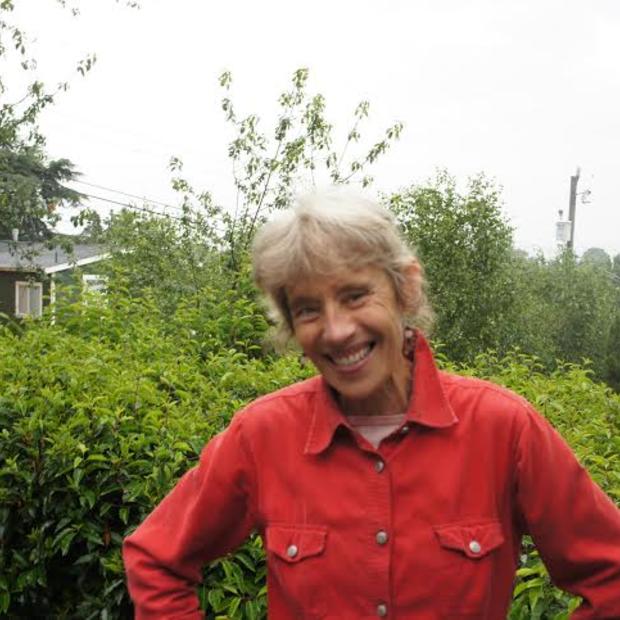Come into the kitchen, the community kitchen, the smells are irresistible. Community Kitchens Northwest are part of a growing trend to make "scratch" cooking fun while improving food security in vulnerable communities. So, we visit a kitchen at a middle school where the chefs are 6th and 7th graders.
Click on the audio player above or here to listen.
It’s the RaVE at Aki Kurose Middle School. It stands for Rainier Valley Eats. Grow the food, share it, and learn how to cook with it.
“Stir it, saute it and get that flavor in there.” Vegan chef Lillian Hill instructs 6th grader Ghi’anna in the art of sautéing vegetables. “I want them to go small. This is a really good combination. You have red and green and white so I want you to remember to keep your plates colorful even if that means you just have to suck it up and have a little bit of green vegetables.” The 6th and 7th graders in this after-school cooking program are here through the efforts of Seattle Tilth, Community Kitchens Northwest, and Public Health-Seattle & King County. A Hunger Free Communities grant from the U.S. Department of Agriculture jump-started the program; couple it with financial support from Group Health, and the after-school program makes healthy cooking fun.
Vegetarian spaghetti served with wheat or corn noodles, garlic bread, and vegan brownies are on today’s menu. “I’ve learned how to cut and I’ve learned about different vegetables and how to sauté.” Sixth grader Unique says she’s also learned new words, like “simmer.” “For instance we’re simmering the spaghetti sauce. Well then I guess when the pot is simmering we put in the noodles."
Chef Hill says the students are more adventurous with meat-free cuisine than when they started: “They love it. They’re actually quite surprised that it tastes as good as it does.” Kale chips, vegan smoothies, meat-free enchiladas and spaghetti with kale, beets, mushrooms, onions. “These are a generation of fast food, of pizzas, hamburgers, hot dogs, even prepared foods that are coming into the home and what we want to teach is how to use produce. This is produce you can get from the local farmers market, produce that you can grow. And they’re able to figure out what to do with these vegetables.”
Leika Suzumura, a dietician with Seattle Tilth, says the idea of Community Kitchens Northwest was born five years ago. Volunteers got together to share their knowledge of scratch cooking and build community around it. “So now we’ve started these school programs as a way to reach young people and hopefully impact change in their lives and also their families.” Most community kitchens, says Suzumura, are interested in seasonal, local, and organic food but it’s also about exposing people to different ways of cooking. “It’s about bringing in their knowledge too from home. We have a very diverse group of students so we want them to bring their food cultures to the classroom.” She says it’s really a shift in social norms. “We want people to look at cooking from scratch as a normal way of living as opposed to the off chance that you might be doing that at home.”
The goal of this collaborative effort is to create “natural food hubs” to improve food security, especially in ethnically diverse and low income communities. A new urban farm, Rainier Beach Urban Farm and Wetlands, is in the middle of the focus community and helping make it happen. “We believe that people need access to growing food.” Diana Vinh withPublic Health Seattle King County. “They also need access to good food distribution and they really need access to cooking skills and preparation skills.” Often people don’t know how to cook with produce especially the kind that grows all year long in the Northwest. “So that’s a lot of what we’re really trying to do. We call ourselves the “Roots and Greens Brigade” and we’re really trying to create fun, life giving, enjoyable programs.”
After eating their main course, vegetarian sphaghetti, the students at Aki Kurose Middle School wait patiently to sample the vegan brownies. I ask 7th grader Coby if he minds being the only boy in the class: “No, not at all,” he says. Did he bring home any new recipes? “I taught them to make tortillas and stuff we make here. You think they liked it? Yeah, they ate a lot of it.” That’s what this community kitchen is all about says Public Health’s Diana Vinh, sharing food cultures and cooking it from scratch. “So next time a friend says, 'Hey let’s go to McDonald’s,' the kid is going to say, "No, let’s go home and bake a pie.' " No doubt with ingredients from the local farm or garden just down the street.
Green Acre Radio is supported by the Human Links Foundation. Engineering by CJ Lazenby. Produced through the Jack Straw Foundation and KBCS.


